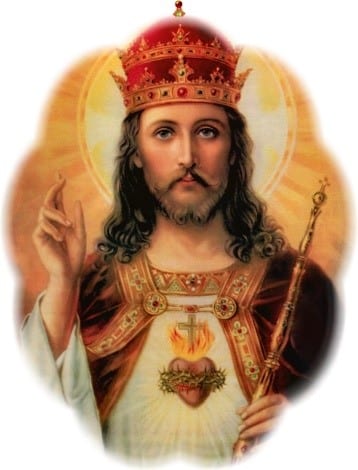
St. Paul’s letter to the Colossians is one of the four epistles written during his house arrest in Rome — the other three are the letters to the Ephesians, Philippians and Philemon. One of the reasons St. Paul composed the letter to the Colossians is to warn the early Christians in Colossae against false teachers who inculcated the worship of angels, whom they regarded as equal to or superior to Christ. Therefore, in the first chapter, St. Paul established the supremacy of Christ over all of creation:
He is the image of the invisible God, the firstborn of all creation. For in Him were created all things in heaven and on earth, the visible and the invisible, whether thrones or dominions or principalities or powers; all things were created through Him and for Him. He is before all things, and in him all things hold together. (Col 1:15-17)
St. Paul makes the strong assertion that Christ is the perfect image of the invisible God, begotten before all creatures. Through Him and for Him all things in heaven and on earth were created, both visible and invisible, material as well as spiritual, and in Him all things are held in existence.
In the book of Genesis, we read: In the beginning, when God created the heavens and the earth — and the earth was without form or shape, with darkness over the abyss and a mighty wind sweeping over the waters — then God said: Let there be light, and there was light. (Genesis 1:1-3)
From this scripture passage, many have thought that God the Father was the sole creator of the heavens and the earth. However, a fuller understanding of creation is that it is the common work of the Holy Trinity (CCC 292). Some have pointed out that the mighty wind that swept over the waters was the Holy Spirit, and therefore the Holy Spirit also had a part in creation. But where is the Son mentioned here?
It is the Gospel of John that provides the role of the Son in creation: In the beginning was the Word, and the Word was with God, and the Word was God. He was in the beginning with God. All things came to be through him, and without him nothing came to be. (John 1:1-3) John’s Gospel reveals that God created everything through the eternal Word, for “all things came to be through Him, and without Him nothing came to be.” Based on this, we can infer that when God said, “Let there be light,” it was through the eternal Word of God, Jesus Christ, that light was created. The same applies to the rest of creation; when God said, “Let there be a dome… Let the waters be gathered and earth appear… Let the earth bring forth vegetation…” and so forth, it was through the eternal Word, Jesus Christ, that all were created.
St. Paul’s letter to the Colossians reveals the magnitude of Christ’s creative power, which included everything imaginable: heaven, earth, all things visible and invisible, including the angels and spiritual powers. Moreover, St. Paul asserted that all things were created through Christ and for Christ. He used similar words in his letter to the Romans: For from Him and through Him and for Him are all things. To Him be glory forever. Amen. (Romans 11:36)
The miracles of Jesus attest to His divine power of creation. To mention a few, Jesus calmed the turbulent sea, thereby re-enacting the establishing of order by God in the dark abyss. Jesus opened the eyes of the man born blind, thereby re-enacting the fashioning of the human face in creation. Jesus raised the dead from the grave, thereby re-enacting the breathing of the human soul and spirit by God into a lifeless body.
When we think about the supremacy of Christ over all of creation, we tend to think of His power and authority, and yet He is supreme in another way. When the beloved apostle John said that God is love (cf. 1 John 4:8), he was not just being sentimental; for he also said that God so loved the world that He gave His only Son (cf. John 3:16a). Let’s examine the depth of that statement: It was this Son, through whom the world was created and kept in existence, who was accused, mistreated, beaten and crucified by His own creatures. The Father allowed all this to happen to His Son, so that through His Resurrection, everyone who believes in Him might not perish but might have eternal life (John 3:16b). The love of God is truly unsurpassable. The supremacy of Christ over all creation is not only in terms of power and authority, but most of all, He is also supreme in love.